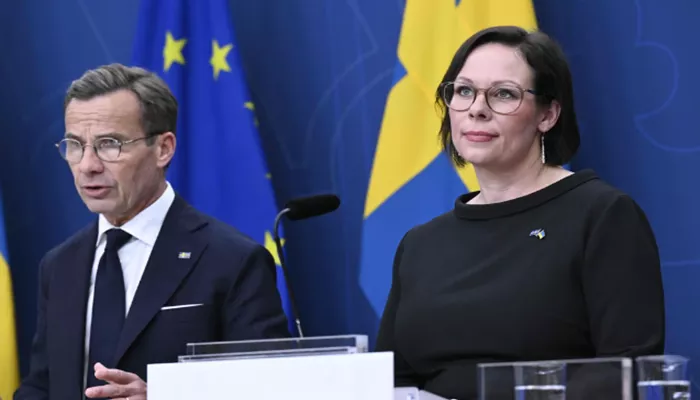Sweden announced plans on Thursday to significantly boost financial payments for immigrants who choose to leave the country voluntarily. Under the new proposal, eligible individuals could receive up to US$34,000, a major increase aimed at encouraging immigrants to return to their home countries.
The Scandinavian nation, long considered a humanitarian leader, has struggled with integrating many of the migrants it welcomed over the past decades. The new plan is part of a broader shift in Sweden’s immigration policies, spearheaded by the right-wing government backed by the anti-immigration Sweden Democrats.
Starting in 2026, immigrants who choose to return to their countries of origin could receive up to 350,000 Swedish kronor (about US$34,000). This is a substantial increase from the current support, which offers 10,000 kronor per adult and 5,000 kronor per child, capped at 40,000 kronor per family.
A Paradigm Shift in Migration Policy
Speaking at a press conference, Migration Minister Johan Forssell described the move as part of a “paradigm shift” in Sweden’s approach to immigration. The government has been rolling out several measures in recent months aimed at reducing migration.
“The grant has been available since 1984, but it’s relatively unknown and underutilized,” Ludvig Aspling of the Sweden Democrats said. He noted that last year, only one person accepted the offer. By increasing the amount, the government hopes to make the incentive more attractive, especially to long-term unemployed migrants or those relying on state benefits.
Targeting Unemployed Migrants
Aspling suggested that the financial offer would likely appeal to hundreds of thousands of migrants who are either unemployed or earning too little to be financially independent. “That’s the group we think would be interested,” he said.
However, a recent government report advised against significantly increasing the grant. Joakim Ruist, head of the inquiry, warned that a larger payout could send a message that migrants are unwanted, which might hinder integration efforts.
A Broader European Trend
Sweden is not the only European country offering financial incentives for migrants to leave. Denmark currently provides around US$15,000, while other countries like Norway, France, and Germany offer smaller amounts ranging from US$1,400 to US$2,800.
Sweden’s Prime Minister, Ulf Kristersson, who came to power in 2022 with a tough stance on immigration and crime, leads a minority coalition government supported by the Sweden Democrats. The party emerged as the second-largest in the last election, capturing 20.5% of the vote.
Decades of Migration and Rising Challenges
Since the 1970s, Sweden has been known for its generous foreign aid and its openness to migrants, many of whom have come from conflict zones such as the former Yugoslavia, Syria, Afghanistan, Somalia, Iran, and Iraq. In 2015 alone, at the height of Europe’s migration crisis, Sweden took in 160,000 asylum seekers—the highest per capita in the European Union.
However, integrating these newcomers has been a challenge. Unemployment rates among immigrants are significantly higher than those of native-born Swedes, leading to increased wealth inequality and placing pressure on Sweden’s welfare system.
The migration crisis of 2015 marked a turning point, with the government—then led by the Social Democrats—acknowledging that it could no longer maintain its open-door policy. Since then, both left- and right-wing governments have introduced measures to tighten immigration controls, including temporary residence permits, stricter family reunification rules, and higher income thresholds for non-EU work visas.
Tougher Measures on the Horizon
Kristersson’s government is also considering additional steps to curb migration, including making it easier to expel migrants for offenses such as substance abuse, ties to criminal organizations, or behavior that conflicts with Swedish values.
Sweden’s changing approach to immigration reflects a broader shift across Europe, as many countries balance humanitarian efforts with the practical challenges of integrating large numbers of newcomers. The proposed increase in financial incentives marks Sweden’s latest attempt to address the issue while encouraging voluntary returns for those struggling to integrate into Swedish society.


